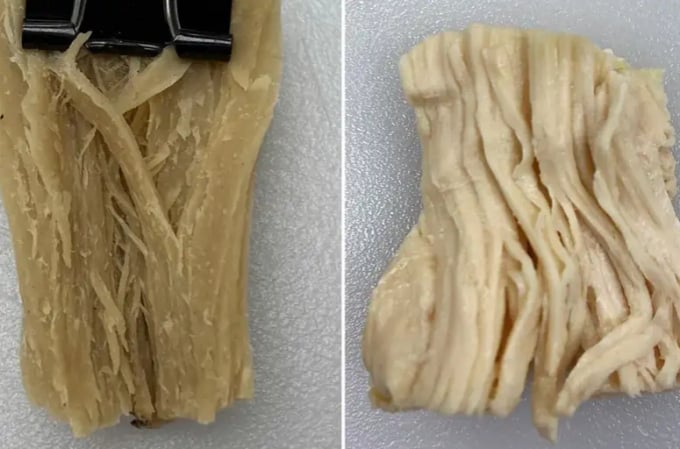June 21, 2025 | 01:36 GMT +7
June 21, 2025 | 01:36 GMT +7
Hotline: 0913.378.918
June 21, 2025 | 01:36 GMT +7
Hotline: 0913.378.918

In a laboratory experiment, proteins in a meat substitute (left) weren’t absorbed by gut cells as well as proteins from chicken breast (right) were Adapted from Journal of Agricultural and Food Chemistry 2022
Dietary protein from plant-based meat alternatives may not be absorbed as well as protein from chicken breast.
“This work opens a door on the nutritional properties of plant-based meat alternatives,” say Da Chen and Osvaldo Campanella, who led the research at The Ohio State University. Chen is now based at the University of Idaho.
In their laboratory-based experiment, Chen, Campanella and their colleagues grew a layer of human gut cells on scaffolds that divided several dishes into two chambers. They then used enzymes from the stomach and small intestine to digest a plant-based meat alternative and a cooked chicken breast, before adding each digested product to one chamber in each dish.
Next, the team measured the amount of protein fragments – or peptides – that passed through the layer of gut cells to reach the opposite chamber in each dish, representing the absorption of protein through the gut.
Within four hours of being added to the dish, which is the longest typical transit time for food in the small intestine, about 2 per cent less protein from the plant-based meat alternative had transferred through the gut cells, compared with protein from the chicken breast. Although a small percentage difference, statistical analysis suggests this result wasn’t a chance finding.
Eating meat alternatives may therefore result in less protein being absorbed through our gut wall into our bloodstream. The researchers didn’t assess whether this reduced absorption leads to protein deficiency.
In the second part of the experiment, the team analysed the digested foods’ peptides, discovering that protein fragments from chicken breast are smaller and more soluble in water than meat-alternative peptides.
“It has been shown that peptides with smaller sizes and higher [solubility] can transfer more easily through [these gut] cells,” say Campanella and Chen.
However, the laboratory model is a highly simplified version of the gut that lacks the mucus lining found in the body, they say.
“In the gut, the peptides need to cross a mucus layer… which serves as a filter… before reaching the intestinal epithelium cells. [We tested protein absorption] without consideration of the mucus layer,” the pair say.
Protein absorption may also differ in the large intestine, where food can remain for up to 24 hours, a timeframe that wasn’t assessed in the experiment.
What’s more, protein uptake from plant-based meat alternatives and other meats beyond chicken breast depends on their individual protein composition and processing.
Despite their results, the team maintains that plant-based meat alternatives are probably a good protein source.
“Even though plant-based meat alternatives had fewer peptides being absorbed, they still provide a good profile of amino acids and could be an adequate complement to a well-balanced diet,” say Campanella and Chen.
The researchers are now working to improve the nutrition absorbed from plant-based meat alternatives.
“Plant-based foods should be carefully designed to ensure that they have similar or better nutritional profiles than animal-based ones,” says David Julian McClements at the University of Massachusetts Amherst.
newscientist

(VAN) Poultry production in Poland, which has only started recovering from devastating bird flu outbreaks earlier this year, has been hit by a series of outbreaks of Newcastle disease, with the veterinary situation deteriorating rapidly.

(VAN) Extensive licensing requirements raise concerns about intellectual property theft.

(VAN) As of Friday, a salmonella outbreak linked to a California egg producer had sickened at least 79 people. Of the infected people, 21 hospitalizations were reported, U.S. health officials said.

(VAN) With the war ongoing, many Ukrainian farmers and rural farming families face limited access to their land due to mines and lack the financial resources to purchase needed agricultural inputs.

(VAN) Vikas Rambal has quietly built a $5 billion business empire in manufacturing, property and solar, and catapulted onto the Rich List.

(VAN) Available cropland now at less than five percent, according to latest geospatial assessment from FAO and UNOSAT.

(VAN) Alt Carbon has raised $12 million in a seed round as it plans to scale its carbon dioxide removal work in the South Asian nation.